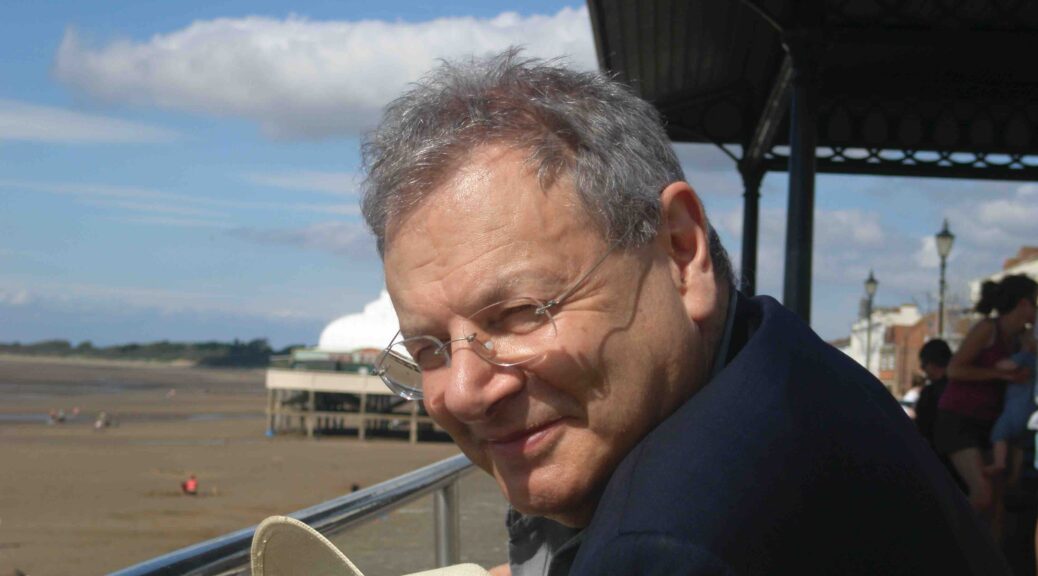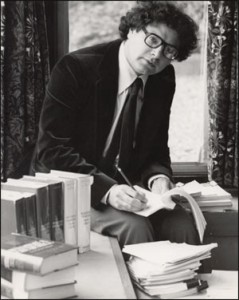
Sir Martin Gilbert CBE, 1936-2015 (2)
The art of the talk
Continued from part 1… “Stop that!” Seated beside him the first time we’d met—the second Churchill Tour on 17 September 1985—I caught Martin Gilbert riffling through a briefcase crammed with sheets of yellow foolscap. As the minutes ticked by before his talk, “Churchill’s London,” he would toss some sheets away. “What are you doing?” I whinged to my new friend. It was the my first Martin Gilbert speech, and here he was, culling it already.
“This is my ‘Speech Form,’” Martin explained, referring to the term Churchill used for his own speech notes: typed texts including every word, the lines picked out like verses of the Psalms.
Martin Gilbert was a superb extemporaneous speaker, with no need for that. His own sheets contained only a few handwritten words. When he began a new subject he would pull one out, glance at the line, toss it aside and ad-lib flawlessly for five or ten minutes. Then he’d pull out another and the process was repeated. If he thought he might run too long, he would self-edit by omitting the sheets he thought superfluous.
“A bore is somebody who tells everything,” my best editor told me. But here at this time, at the Waldorf Hotel in London, we wanted Martin to leave nothing out. We were Churchillians. We would hang on every word. But Martin kept culling, sympathetic to his audience, determined to fit his talk into what he thought was the right amount of time.
“Humility, humour, command”
A Gilbert lecture, wrote Matthew Gould, British Ambassador to Israel, was a mix of “humility with humour and extraordinary command of detail.” There were no grand flourishes or great cadences. Martin “kept his audiences rapt in attention. His understated and diffident style often left me feeling he was on the verge of running dry—only to answer every question with a great depth and understanding.”
His written work is much the same. Critics would complain that he was too methodical, too “stuck” on chronology. But for Martin, as Andrew Roberts observed, chronology was the key. It was his job in the “Great Work” to place the reader on Churchill’s shoulder, personally observing the march of events. He would explain what happened when, and what stemmed from it.
Let others make broad pronouncements about whether Churchill was wise or foolish; Martin Gilbert made his views plain from his selection of material. And few ever challenged the validity of that selection. The only times I saw him disgruntled were when later writers treated as a revelation some fact or anecdote he’d published decades before.
Always the same Martin
I marveled at his spontaneity. Like Churchill’s, his public voice was the same as his private one. Martin was conversational with vast recall, and a studious disregard for “revisionist” nonsense. He knew the story so well, you see. He knew it having sifted through more papers, documents, interviews and transcripts than anyone else on the planet. His words simply flowed, fact upon fact, with irrefutable logic.
Always he would portray the same Churchill, a character with human faults and frailties, driven by a love of liberty and his fellow man. “I never felt that he was going to spring an unpleasant surprise on me,” Martin remarked to Max Hastings. “I might find that he was adopting views with which I disagreed. But I always knew that there would be nothing to cause me to think: ‘How shocking, how appalling.’”
Asked once to describe Churchill in a single sentence, Martin said nothing about blood, toil, tears and sweat. Churchill, he said, “was a great humanitarian who was himself distressed that the accidents of history gave him his greatest power at a time when everything had to be focused on defending the country from destruction, rather than achieving his goals of a fairer society.” I think this illuminates Martin’s Churchillian optimism: That somehow, in the end, “all will come right.”

He meant so much to us all
Many Churchill writers, like Douglas Russell, remembered how honored they were by a Gilbert foreword to or approval of their books. In my own book of quotations, Churchill by Himself, he not only wrote the introduction, but coined the best promo line we could hope for: “Unputdownable.” I was so very honored by his praise.
His generosity was unending. A devout Jew, he never failed to wish his Gentile friends a Happy Easter—even those who were not particularly religious. With me at a Boston bookshop, he pulled book after book of his off the shelves, paid for them, and inscribed them on the spot. I wondered how many authors could visit a shop and find four of their books on the racks. (Or what the proprietor thought of this stranger scribbling in his stock!)
A constant friend, Martin was always there for us, answering complicated questions, producing scholarly articles, traveling to lecture at conferences near and far, guiding our tours of “Churchill’s Britain.” In Suffolk, he joined us at Stour, Randolph Churchill’s old home. It was his first visit since Randolph’s death, and Martin shed tears of memory.
“Rose-lipt maidens, lightfoot lads”
His phenomenal recall rarely missed a reference. When I offered him the toast, “Rose-lipt maidens, lightfoot lads,” Martin exclaimed: “Housman. From Out of Africa.” (Sydney Pollack’s great film with Streep and Redford, based on Isak Dineson’s book).
Martin always downplayed and offered no details of his counsel to successive prime ministers from Margaret Thatcher to Gordon Brown. But he did once share an amusing anecdote. In the Middle East to meet with Palestinian leader Yasser Arafat, Prime Minister John Major introduced Martin as “my guru.” Consternation and a buzz of chatter arose in the Arab delegation. It finally emerged that they weren’t sure what a guru was. Yet Mr. Major had exactly described Martin’s role.
Last autumn I had the honor to produce a festschrift in Martin’s honor, where 20 writers and friends spoke of his devotion to history, his generosity and friendship. His wife Esther was one of the contributors, and able to read each piece to him. She says he signified that he understood. I am glad we were in time.
The time you won your town the race
We chaired you through the market-place;
Man and boy stood cheering by,
And home we brought you shoulder-high.
To-day, the road all runners come,
Shoulder-high we bring you home,
And set you at your threshold down,
Townsman of a stiller town.
So set, before its echoes fade,
The fleet foot on the sill of shade,
And hold to the low lintel up
The still-defended challenge-cup.
—A.E. Housman, A Shropshire Lad







One thought on “Sir Martin Gilbert CBE, 1936-2015 (2)”
I wrote a review of Sr Martin’s book Jerusalem in the early 90s. Several months later I received a charming missive that I treasure to this day.
–
He was like that. Thanks
Comments are closed.